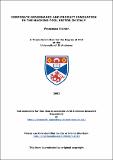Files in this item
Corporate governance and product innovation in the machine-tool sector in Italy
Item metadata
| dc.contributor.advisor | Reid, Gavin C. | |
| dc.contributor.author | Visintin, Francesca | |
| dc.coverage.spatial | 296 p. | en_US |
| dc.date.accessioned | 2017-06-29T13:08:03Z | |
| dc.date.available | 2017-06-29T13:08:03Z | |
| dc.date.issued | 2002 | |
| dc.identifier | uk.bl.ethos.546717 | |
| dc.identifier.uri | https://hdl.handle.net/10023/11116 | |
| dc.description.abstract | In this thesis we study the influence of corporate governance on product innovation in the machine-tool sector in Italy. The theoretical framework employed in the analysis is part of the Systems of Innovation literature. It can be defined as a "national-technological system of innovation" type of approach as it distinguishes between countries with different systems of corporate governance and between sectors that employ different technologies. The main hypothesis is that variations in national systems of corporate governance can help to explain national patterns of sectoral specialisation. The thesis focuses on the Italian National System of Innovation from the point of view of its corporate governance. The main characteristics of the system are analysed in the first part of the thesis where it is also shown how they can help to explain the Italian industrial specialisation. The study proceeds with an application of the theoretical framework to the analysis of the machine-tool sector, its technology and its historical evolution. A particular focus is put on the decline of the US in the sector during the 1970s and 1980s and the corresponding upsurge of Japan. The final part of the thesis studies the Italian System of Innovation in the machine-tool sector. It highlights that firms are not the only actors in the System and that other stakeholders, such as customers and suppliers, play an important part in the innovation process. It shows also that the system presents some weaknesses, consisting mainly of the lack of financial resources, that need to be resolved. Our final argument, supported by an econometric analysis, is that one of the solutions suggested by the machine-tool builders association, namely a wave of mergers and acquisitions, is not necessarily the best answer. A stronger coordination and cooperation among competing and non-competing firms appears to be the most incisive solution from the point of view of innovation for this sector. | en_US |
| dc.language.iso | en | en_US |
| dc.publisher | University of St Andrews | |
| dc.subject.lcc | HD9703.I8V5 | |
| dc.subject.lcsh | Machine-tool industry--Italy | en |
| dc.title | Corporate governance and product innovation in the machine-tool sector in Italy | en_US |
| dc.type | Thesis | en_US |
| dc.type.qualificationlevel | Doctoral | en_US |
| dc.type.qualificationname | PhD Doctor of Philosophy | en_US |
| dc.publisher.institution | The University of St Andrews | en_US |
This item appears in the following Collection(s)
Items in the St Andrews Research Repository are protected by copyright, with all rights reserved, unless otherwise indicated.

